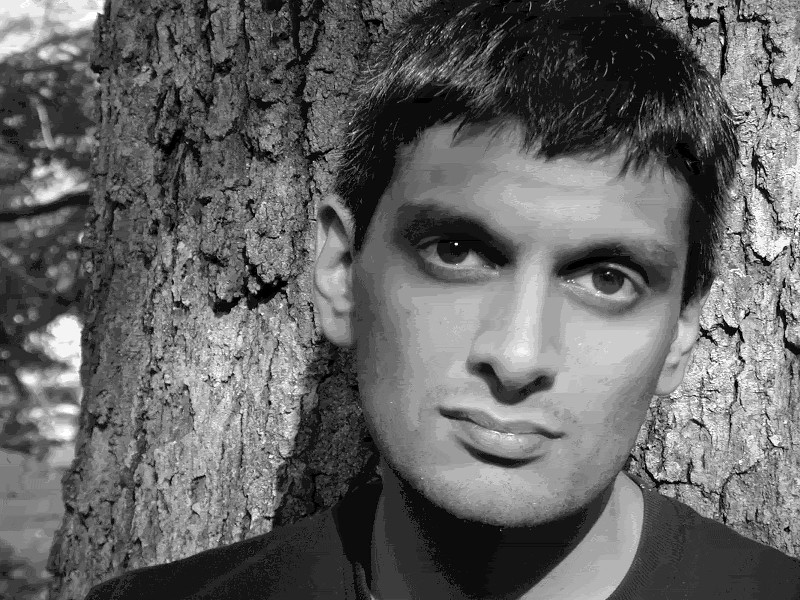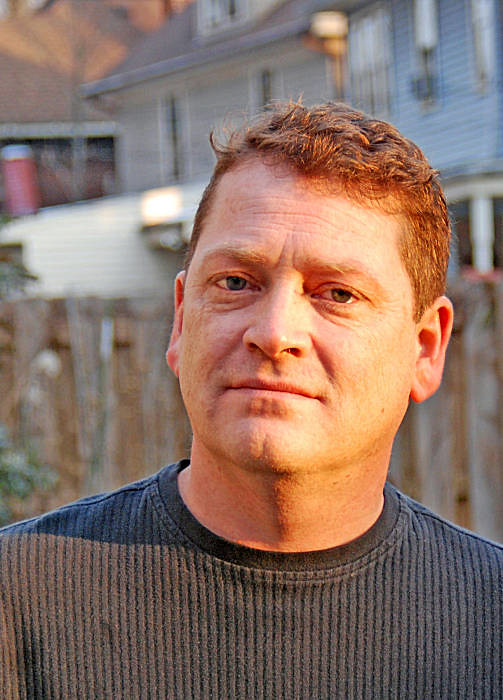Oberlin Blogs
Why Creative Writing?
October 6, 2009
Aries Indenbaum ’09
"Can you tell me about the creative writing major?"
Yeah. I see you. Every time the admissions office is full, I know there's one or two Writers. Sometimes, we bee-line for each other, and I yammer about my department for as long as they can stand still. But some other times, we miss each other. And I know you want to know.
"Why Creative Writing? Why is it so great?"
1. The professors are great.
I CANNOT OVERSTATE THIS POINT. They are incredible, supportive people and smart, demanding professors. They challenge you, while maintaining an incredibly relaxed bond.
Moreover, they're all "Writers in Residence," writing all the time. Dan Chaon, for instance, just published a new novel, Await your Reply, which was just reviewed in the NYTimes. Kazim Ali is always on tour for his books, giving readings and talks. He just gave a reading last Monday.
Yet their own doesn't take them away from teaching -- they're always there for you as a student or advisee. They give fantastic criticism, helping you to learn how you can write better and more clearly. There's no set style, no "rules," just the question of "does it work?"
All of the professors go by their first names: I never had an awkward back-and-forth issue of "Professor... Kazim?"

Kazim Ali. Poet and hero.
Warning: Tangent!
Randal Doane aka Dean Doane aka Chief once gave an amazing short lecture on first-last name malfunctions and teacher coolness scales. Studies showed that student will generally find their professors "cooler" if they curse or allow cursing in class, and if they can be called by their first name. He was struggling with the strange advantages of informal status with students. As a Dean, his relationship with students is way different than professors, but being a cool guy, he wants students to feel comfortable around him and not treat him like The Man.
I've found that being on a first name, chill-out basis with my bosses has greatly improved our relationship and my ability to get sh*t done. A work relationship is so obviously hierarchical -- you make rules, I follow; you assign task, I do it. A more egalitarian flavor negates any personal resentment, or confusion of job and personality. If I'm more at ease with my boss, I work harder. If I can curse around them, I do better.
[image no longer available]
I understand, Chef.
Sadly, I curse a lot. When I think about a particularly unpleasant topic, my impulse is to say, "Wow, that's f**ked up," rather than a more mild, nuanced statement. While this is a sloppy habit, and a character flaw, it's hard to break. I can guard my tongue, but it takes effort. As an informal person, trying to filter my words stresses me out a tad; I'm more worried, nervous and self-conscious. If I can drop the F bomb freely, or casually remark that John West is a total BAMF, all is well.
And writing (and reading) sometimes elicits pejoratives. I can't count the number of times I've read a peer's writing and just blurted out a cuss-word in joyous amazement. Or several cuss-words, connected with a religious metaphor. That bleeped out phrase? That means that I liked it.
The success of the creative writing department is feeling comfortable with one's professors, at ease enough to show them your work while it's still young, bleeding and gross. You can point at a character and say why he's an a**hole and then say why that's a problem in the work. It means you can focus on content more than phrasing, making workshops more organic and less stiff.
...Sometimes it's hard to show a professor a draft because drafts tend... to suck. Showcasing a weakness seems counterintuitive. But much of creative writing exists in draft form for a very long time, with many drafts quite personal and raw. If you don't trust your professors... workshops would be agonizing. Even with the cool factor, I'm still deeply motivated by my fears. Oberlin students are often moved by the fear of disappointing their professor... only matched by their desire to make their professors love them.
As a recent-grad-now-staff, I still agonize about the possibility of Chelsey looking at me with huge, mournful eyes, and asking how my writing is going and whether I've published something recently.
A year of the major is one-on-one "independent writing projects" with teachers. It's grad school in a can, meeting with professors once a week to talk about your projects, work, lives and other business. Making it as a budding writer is terrifyingly difficult; having a mentor (or three) is really important. And in those meetings, the importance of a casual, but professional rapport is key. You have to feel comfortable, as well as respectful.
Fortunately, professors make it easy.
2. Classes are workshops.
From Sylvia Watanabe's Novella Syllabus:
Definition of Terms (Webster's Third New International Dictionary):
Workshop: A place where artistic or literary production occurs.
Showcase: A glazed case, box, or cabinet for showing wares or
articles in a store or a museum.
Class mantra: This is a workshop.
I didn't realize until I interned that workshop has multiple meanings. In an Oberlin workshop, you sit in a circle with 12 other Obies and a professor.
And for the next three hours, you talk about the work you read: published author and those of the students in your class. You give and receive constructive criticism; you absorb praise and critiques. Your peers and prof help you build a better story.
You don't write in class, or read. You talk and think. For three hours.
Results? You work a LOT to prepare for class. Between writing, editing, and reading, I could spend all of my time on writing classes. And while I can't (other classes + commitments, sadly), I always wanted to. The more you put into a class, the more you get out. It's not a one-to-one deposit-to-withdrawal; it's exponential gain.
And your writing improves. And evolves.
Or, as Sylvia put it, "Fortune cookie: The burden will be great."
Moreover, learning how to workshop is an incredibly effective skill, learning how to formulate thoughts articulately, give effective criticism, and respond to disagreements. Most importantly, I've learned when to shut up.
The class is very democratic, with each students' voice as equal. There are no favorites and no competition.
On the first day of one of David Walker's drama classes, we did name-games with more vigor than usual. "You're going to be directly responding to each other, so you should know each other's names." He, and most creative writing professors, ask that students call on each other, to make class move more organically. That said, when David, or any professor gives their advice, the class dynamic shifts a bit, pauses, and regroups.
Despite the egalitarian nature of the workshop, professors are professors. That is, more intelligent, well-read, and better communicators than the rest of us.
[image no longer available]
David Walker, champion.
3. Classes are in everything.
Hey, I made a list! Screenwriting, Fiction, Poetry, Non-fiction, Novella, Playwriting, Nature Writing, Graphic Narrative, two Intro classes and teaching Poetry and Prose.
There's also classes offered by Rhetoric and Composition that can complement Creative Writing, as well as journalism.
The difference between Creative Writing versus English classes? Writing versus Reading. In a writing class, you have an hour's worth of reading, several hours of editing, and many hours of writing. In an English class, the balance is flipped. You have many hours of reading and a short response to write, or a short paper.
[image no longer available]
Sylvia Watanabe is also an amazing noun.
From Sylvia's syllabus: "On Editorial Remarks: But WHY does that text suck?"
4. All types of writing are cool.
I write mostly speculative fiction, in which one writes about the future to think about the past. No teacher has ever been judgmental or cruel to me. In classes, I've read contemporary horror, magical realism, narrative nonfiction, hyper-realistic fiction, and lyrical poetry. That said, the majority aren't genre writers. But if you are a fan of writing about worlds a tad different from ours, it's not an automatic out.

Dan Chaon. Unnaturally filled with stories.
5. Your peers are priceless.
It's true. Peer critiques are awesome - people disagree a lot. I wrote a story that took place in a small community in Britain, in which the majority of the charcters were Indian. But because of sloppiness on my part, my peers thought I had written an alternative history in which India had imperialized Britain (and the world). Which was awesome. After those comments... I clarified myself a lot more.
Their writing is so good. So, so good. Whether it's fun or really heavy, it's fantastic.
[Image no longer available]
Bernard Matambo, who rides his bike everywhere.
NEXT POST:: The class application + Aries fails + Writing on Campus + What do you do with a BA in Writing?
Any questions? Comments?
Similar Blog Entries

Managing an Oberlin Workload
April 25, 2025
All you need to know about the transition from high school to college course work.

Communal Creative Writing
April 10, 2025
There's nothing quite like the energy in a Creative Writing workshop.
